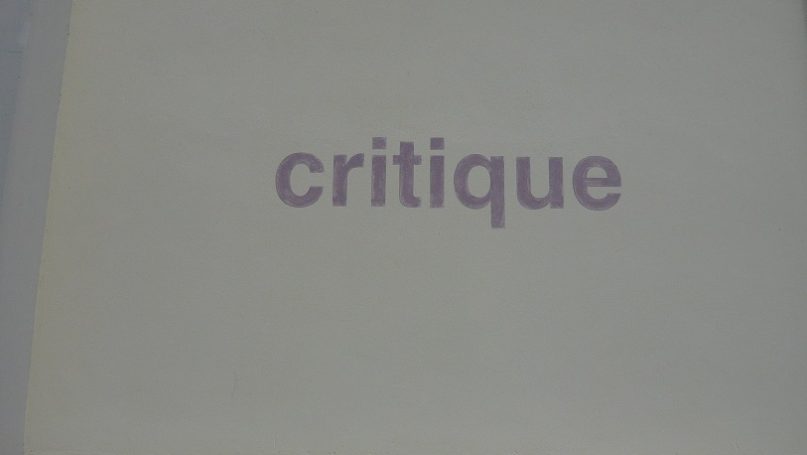
Jacques Rancière, the famous French Marxist, wrote in his brilliant Hatred of Democracy that “critique acknowledges something’s existence, but in order to confine it within limits.” In an age where critique has significant potential to serve our students within shifting political contexts, professors and students must reengage with what it means to critique and challenge arguments: a real difficulty given broader trends in campus culture to dismiss or censor arguments that simply cannot be ignored.
This is not an argument about free speech. Failing to teach our international relations/political science students how to critique an argument is a failure of civics education, and a failure to guide students in the process of developing their own value judgments.
It is easy to find examples of this refusal to engage on the part of students, the latest controversies being the disinviting of controversial speakers—like Ann Coulter—to campuses. In my own courses, I have noticed this trend as well. In a seminar session of my “Introduction to Political Science” course, I asked my students “if the university invited a controversial speaker to campus—whose views were different than your own—what would your reaction be?” One student offered: “I wouldn’t like that if it made any of my friends uncomfortable.”
This is not limited, nor has it likely begun, with the students. Scholars are guilty of this as well. Most prominently of recent is the controversial demand by many professional philosophers that the feminist studies journal Hypatia formally retract a peer-reviewed article written by Dr. Rebecca Tuvel on the idea of “transracialism.” Rather than write responses, or challenge the argument itself, prominent academics joined a chorus of voices calling for a removal of the piece from Hypatia’s archive.
As instructors, and professional educators, there are three reasons we must focus on instructing students in the value of critique instead of dismissal. There are concrete ways we can accomplish this in our own pedagogy.
First, arguments should be engaged with to be challenged. Rousseau did not ignore Hobbes when he challenged the latter’s view on human nature. In fact, he mentions him by name in both of his “Discourses.” Marx did not ignore classical economic theory in his critique of capitalism. On the contrary, he embraced many of its assumptions to offer an internal challenge to it. And, more profoundly, as I try to show my international relations students—a failure to engage with the other side of an argument does not make that argument disappear, it just causes the other side to ignore your argument as well. If the global rise of right-wing populist movements in recent years has shown anything, it is that people will flock to politicians who can tap into that feeling of dispossession and silence.
Giving students activities that can cultivate their ability to develop contrarian arguments by critiquing others is vital. John Stuart Mill’s adage that to be effective critics we must portray the counterargument in its best possible light is a truism. The Socratic Method is your friend in this regard, but so is the courage to assign challenging and (sometimes) infuriating works that will stimulate your students’ critical faculties. I will likely never forget when a student last semester turned in a book report assignment for extra credit from my list of “controversial books.” She wrote her essay on Frantz Fanon’s classic Black Skin, White Masks. I was shocked when she turned in a twelve page essay (instead of a five page essay, as the assignment stated) with a note attached that read “I’m sorry this is so long, Professor Tatum. I needed more space to deal with Fanon’s absurd attacks on women.” Creating a culture in our classrooms where students feel comfortable engaging with difficult and controversial ideas gives them a basis to develop their own arguments.
Second, teaching students to be critical of other arguments does not entail a complete disavowal of values. We owe it to our students to help them uncover and develop their own value systems. Nihilism is not the solution in teaching critique. This starts with our own work as scholars. Critiquing liberalism, or democracy, or capitalism does not have to be a rejection of those ideas—as Gayatri Chakravorty Spivak notes, critique is “not just destruction. It’s also construction.”
Professors don’t have to disavow their value systems in this engagement with alternative arguments either. My political science and international relations students learn key arguments in the Western tradition of political thought; however, they also learn to engage with what the limits and future possibilities of that tradition are by engaging with non-western thinkers, marginalized voices, and alternative perspectives. What a proud teaching moment it was to hear a student say “Hey, Professor T! I don’t think Judith Butler’s argument about social norms is all that different from that Rousseau dude!” I’m not sure Professor Butler would agree, but finding connections between liberalism’s greatest modern defender and perhaps its greatest critic serves an important moral purpose.
Finally, utopia cannot be imagined without critique. We cannot ignore the alternatives while developing the ideal. As a professor who teaches students about politics and international relations, I don’t want them to leave college having simply torn down everything they’ve been exposed to—floating off in a cloud of nihilism. I want my students to leave with a vision. And I want to give them the critical tools to put that vision into practice. That’s why I teach, and that’s why I value re-instilling critique into our pedagogy.
Further Reading on E-International Relations
- Working with and Supporting Teaching Assistants
- Teaching International Relations as a Liberal Art
- What to Do When You Don’t Like a Topic You Teach?
- Getting the Most Out of Class Discussion
- Let’s Talk: Transformative Leadership and International Relations
- The Politics of Teaching International Relations in the Arab World: A Critique